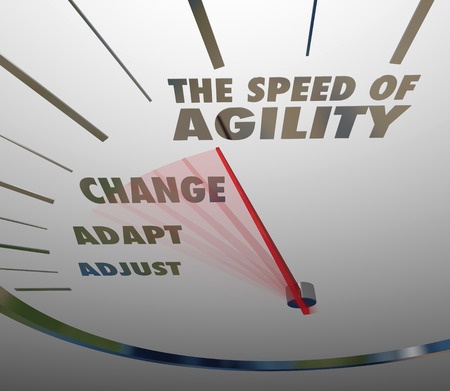
By Elisabetta Lando
In business a lot of people might be feeling that a fast paced and seemingly chaotic world is overwhelming with demands which are increasingly out of their control. The old structured frameworks that gave us that clarity of direction just don’t seem to work so well anymore; slow, expensive and not quite hitting the right note. This is probably one of the reasons why so many businesses are developing an ‘agile’ approach to new product and service development. Just the word conjures up panther like fluidity and it is indeed the fluidity of a ‘just in time’ approach at the point of need, open to constant adaptation, learning through mistakes (very quickly) as well as the three big ‘C’s; creativity, collaboration and communication that makes ‘agile’ working so effective.
‘Agile’ can be applied to most areas of business development with the aim of achieving a highly flexible and interactive approach. It’s not just business that can benefit from this approach, it can prove to be very effective in education as well for projects such as developing a blended model of provision or setting up an online collaborative workspace. It is also a method of working that is extremely useful to those developing their employment prospects as the ‘agile’ skills are very valuable to employers.
Being agile is something that can sound nerve jangling and only relevant to big global companies. However, in a recent Towards Maturity report successful organisations that developed a sustainable agile approach to great effect were most definitely not big companies, but were organisations where technology was fundamental in developing this approach. Successful e-mature organisations are realising some very palpable benefits in their delivery of training through the use of blended and mobile learning. For example; 40% used bespoke mobile apps, compared to 20% of non-achievers and 82% used mobile devices compared to 64% non-achievers.
Being agile means being adaptive; a desire to consult and learn from things that have not worked so well. It is a tall order to expect to get everything right in one go so the willingness to be able to adapt and change very quickly is not a failure but rather it is part of the process. For example, using technology to gather performance data from online training courses, as well as gathering feedback from learners, means content and curriculum can be quickly changed and customised according to need. Again an increasing number of those high achieving organisations are using data to this end; for example 38% collect data on the effectiveness of their training on actual job performance.
Lastly, as mentioned above, the agile approach relies strongly on communication and collaboration; all vital skills for staff and learners to develop. So technologies that connect people are fundamental. Individuals can get peer to peer support and develop their own PLN (personal learning networks); all of which can be easily set up. Research shows that 57% of agility achievers make use of online learning communities compared to 42% of non-achievers and 57% of agility achievers promote communities of practices, compared to 47% of non-achievers. Furthermore, 87% use communication tools such as chat, IM, SMS and newsletters compared to 71% of non-achievers.
In this fast moving and ever changing world an agile approach is pretty much essential. With online training programmes, mobile learning as well as social technologies, an agile approach can support an organisation in developing a powerful yet cost effective learning experience that can really support the learner in a personalised way, meaning you can adapt just as fast as the world demands it.
If you are interested in Agile training take a look HERE at a range of courses.







 UK: 0844 854 9218 | International: +44 (0)1488 580017
UK: 0844 854 9218 | International: +44 (0)1488 580017








